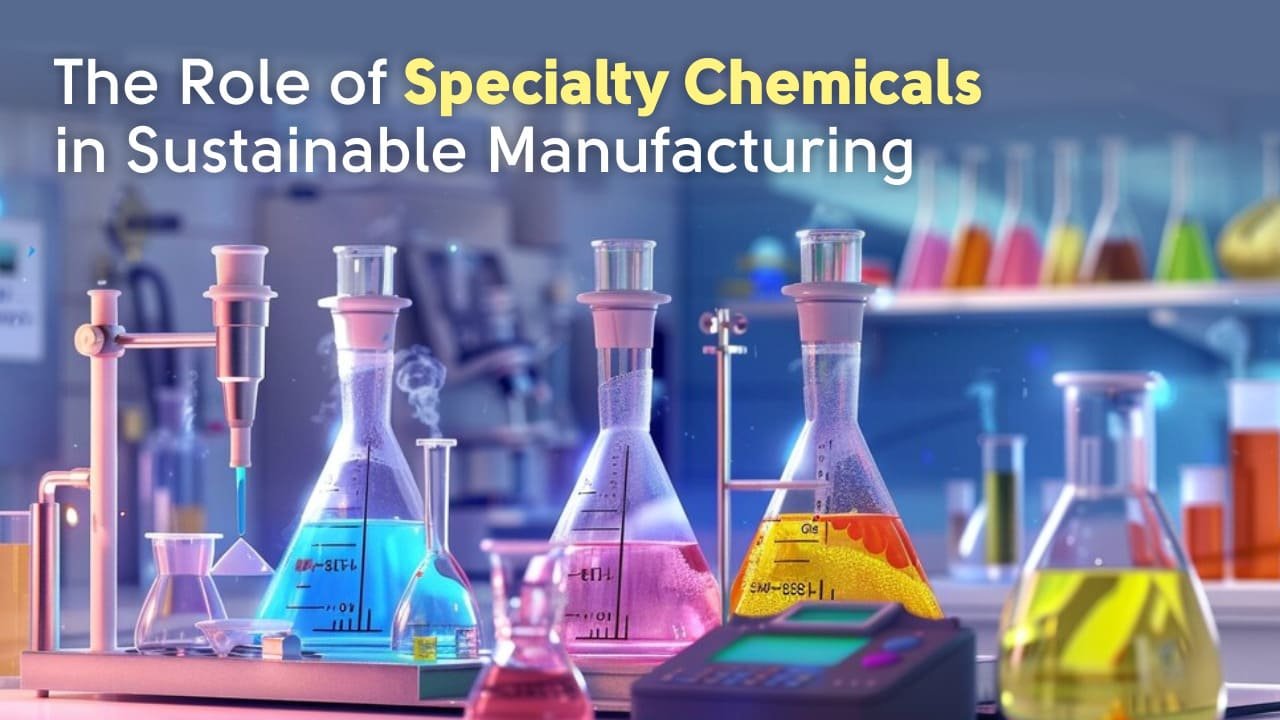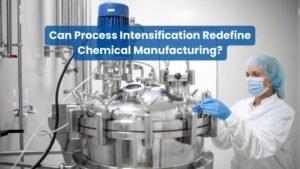Sustainable manufacturing is a critical goal for industries worldwide, driven by the urgent need to reduce environmental impact, conserve resources, and create more efficient processes. Within this context, specialty chemicals play a crucial role. These chemicals, often designed for specific applications, help industries innovate and move toward more sustainable practices. This blog explores the pivotal role of specialty chemicals in sustainable manufacturing, highlighting their applications, benefits, and potential for the future.
What Are Specialty Chemicals?
Specialty chemicals, unlike bulk chemicals, are produced in smaller quantities and are designed for specific functions. These chemicals are essential in various industries, including agriculture, electronics, automotive, textiles, and personal care. Their applications range from improving product performance to enabling more efficient manufacturing processes.
Sustainability in Manufacturing: A Brief Overview
Sustainability in manufacturing involves minimizing waste, reducing energy consumption, and utilizing resources efficiently while ensuring that processes do not harm the environment. The goal is to create products that are not only of high quality but also environmentally friendly throughout their lifecycle—from raw material extraction to disposal.
The Role of Specialty Chemicals in Reducing Waste
One of the significant challenges in manufacturing is waste generation. It can help in reducing waste through various means:
- Catalysts- Specialty catalysts can accelerate chemical reactions, making processes more efficient and reducing the amount of raw material needed. This, in turn, decreases the waste generated.
- Advanced Coatings- Specialty coatings can extend the lifespan of products, reducing the need for frequent replacements and, consequently, the waste associated with disposing of old products.
- Biodegradable Polymers- It is used to create biodegradable polymers that break down more easily in the environment, reducing plastic waste.
Energy Efficiency
Energy consumption is a significant concern in manufacturing. It contribute to energy efficiency in several ways:
- Thermal Management- It is used in thermal management systems that help regulate temperatures in manufacturing processes, leading to lower energy consumption.
- Efficient Lubricants- Advanced lubricants developed using specialty chemicals can reduce friction in machinery, leading to lower energy usage and longer equipment life.
- Solar Panel Efficiency- It is used in the production of solar panels, enhancing their efficiency and making renewable energy more accessible.
Water Conservation
Water is a critical resource in manufacturing, and its conservation is essential for sustainability. It contributes to water conservation through:
- Water Treatment- It is used in water treatment processes to purify water and make it reusable, reducing the overall consumption of fresh water.
- Process Optimization- In industries like textiles and paper, It helps optimize processes to use less water and produce less wastewater.
- Desalination- It is essential in desalination processes, enabling the conversion of seawater into usable fresh water for industrial applications.
Reducing Emissions
The reduction of greenhouse gas emissions is a key aspect of sustainable manufacturing. It plays a vital role in this area:
- Emission Control- It is used in emission control systems, such as catalytic converters in vehicles, to reduce harmful emissions.
- Carbon Capture- Innovative specialty chemicals are being developed to capture carbon dioxide from industrial processes, preventing it from entering the atmosphere.
- Low-VOC Products- The development of low-volatile organic compound (VOC) specialty chemicals has led to the creation of paints, coatings, and adhesives that release fewer harmful emissions.
Innovations in Specialty Chemicals for Sustainability
The specialty chemicals industry is constantly evolving, with innovations focused on sustainability. Some of the emerging trends include:
- Green Chemistry- The development of specialty chemicals using green chemistry principles ensures that products are designed to be safe for the environment and human health from the start.
- Biobased Chemicals- It derived from renewable resources, such as plant-based materials, are becoming more common. These biobased chemicals reduce dependence on fossil fuels and decrease the carbon footprint of manufacturing processes.
- Recyclable and Reusable Chemicals- Some specialty chemicals are designed to be recyclable or reusable, contributing to a circular economy where resources are continually cycled back into use.
Challenges and Future Outlook
While it offers numerous benefits for sustainable manufacturing, there are challenges to overcome:
- Cost- Developing and implementing it can be expensive, which may deter some manufacturers from adopting these technologies.
- Scalability- Some specialty chemicals are still in the early stages of development and may not yet be available on a scale large enough to make a significant impact.
- Regulatory Hurdles- The introduction of new specialty chemicals often requires navigating complex regulatory environments, which can slow down their adoption.
Despite these challenges, the future of specialty chemicals in sustainable manufacturing is promising. As industries continue to prioritize sustainability, the demand for specialty chemicals that can drive innovation and efficiency will only grow.
Case Studies
Several industries have successfully integrated specialty chemicals into their manufacturing processes, achieving significant sustainability benefits. Some examples include:
- Textile Industry- The use of specialty dyes and finishes that require less water and energy during application has transformed the textile industry, making it more sustainable.
- Automotive Industry- Developing lightweight materials using specialty chemicals has led to more fuel-efficient vehicles, reducing emissions and improving overall sustainability.
- Electronics Industry- They are used in producing energy-efficient electronics, from semiconductors to batteries, contributing to the sustainability of the tech industry.
Conclusion
Specialty chemicals are integral to the advancement of sustainable manufacturing. They enable industries to reduce waste, conserve energy and water, and lower emissions, all while maintaining high-quality production standards. As the world moves toward a more sustainable future, its role of will continue to expand, driving innovation and helping industries meet their sustainability goals. GSP Chem, as a leader in specialty chemicals, is at the forefront of this movement, developing products that not only meet the needs of today but also pave the way for a more sustainable tomorrow.







